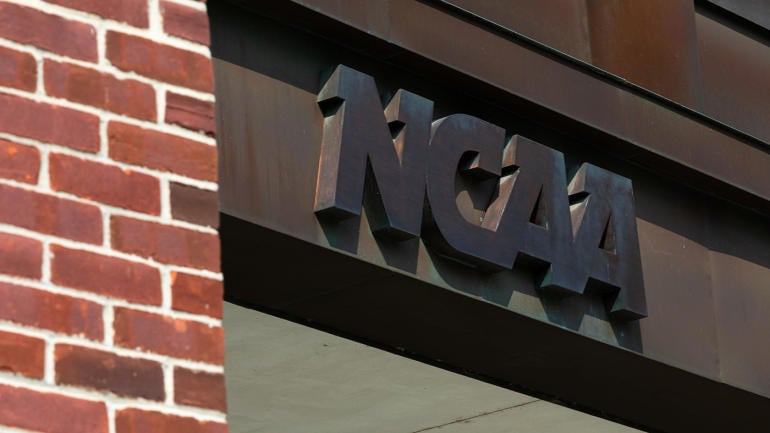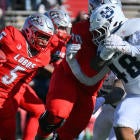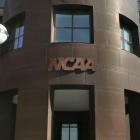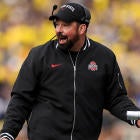
Last month, the professional organization representing FBS athletic directors issued what amounted to a veiled ultimatum. The "overwhelming majority" of those ADs at a Lead1 Association meeting in Washington D.C. had a "strong preference" the NCAA continue running major-college football if the association "can be more streamlined and less bureaucratic."
Or else … what?
The answer has opened the door to perhaps not a breakaway of major college football and basketball but at least a forming picture of what a new structure would look like. A growing number of those ADs believe they have a unique and powerful hammer as leverage if the NCAA doesn't clean up its act.
"If not," a Lead1 executive said. "We would explore other options."
Among those implied options, CBS Sports has learned, is leveraging schools' participation in the NCAA Tournament. While a separate basketball tournament operated outside of the NCAA isn't likely anytime soon, the ADs' realization they could create such an event provides a picture as to how the NCAA's two biggest sports will be run in the future.
A football breakaway has long been discussed -- it is more likely than one in basketball -- as the NCAA's power diminishes as membership has demanded a reorganization of the 117-year-old organization.
Approximately 80 FBS ADs traveled to Lead1's mid-September meeting in person. Another 20 participated virtually, putting 100 out of 131 total in attendance. They saw two compelling presentations made by former West Virginia AD and NCAA executive Oliver Luck and North Carolina associate professor of sports administration Erianne Weight.
One presentation was a model with college football continuing to operate inside the NCAA. The other showed the FBS going "completely independent" of the NCAA, according to a source.
"It was about as unanimous as it could get," Lead1 CEO Tom McMillen said of his membership's reaction to football governance. "It was, 'Fix it or we will seriously consider move options.'"
Basketball is involved in the discussion because the revenue from the NCAA Tournament is used by the association to essentially run major-college football.
The NCAA does not sponsor an FBS championship. Meanwhile, the tournament is the mother's milk of the association itself bringing approximately $800 million per year. Approximately 80% of that goes back to the members.
McMillen compared more oversight of major-college sports by his members to a "discharge petition." In parliamentary procedure, such an act means bringing a bill to the floor for a vote without a report from a committee.
In this case, that "committee" represents the bureaucracy of the NCAA.
"If the ADs stand together, they can almost accomplish anything," McMillen said.
Lead1 is essentially an advisory group when it comes to NCAA matters, but change has to start somewhere.
Ohio State AD Gene Smith raised eyebrows last summer when he suggested to ESPN that the College Football Playoff take over FBS. He was not alone. In December 2020, the reform-minded Knight Commission essentially suggested the same thing.
Lead1 and its members hope to gain more power over major-college sports as the NCAA remakes itself through a rewritten constitution that will give more power to the schools.
To that end, Lead1 was encouraged to see its views were taking hold recently when the NCAA adopted seven of its 11 recommendations. Among those was the abolition of the much-criticized Independent Accountability Resolution Process.
The future of basketball was not discussed formally last month. Various college officials came out of that Lead1 meeting contending there is no grant of rights between the Division I schools and the NCAA that binds them to play in March Madness. The grant of rights is most commonly known as a document schools sign that assigns their television rights to their conference. Lead1 executives and other ADs confirmed to CBS Sports that there is no such binding document.
"It's not ironclad," said McMillen. "That's my quote. It's just not ironclad [that they participate]."
When asked what binds those schools to the tournament, NCAA general counsel Scott Bearby referred CBS Sports to Bylaw 31.2.1.1 It states: Eligible members in a sport … will participate [if selected] in the NCAA championship or in no postseason in that sport.
"I don't know the consequence, for instance, if a team that qualified for a conference automatic bid, their choice [was] to not participate," Bearby told CBS Sports. "I don't know what that would mean."
While there is no overt movement for Division I to stage its own basketball tournament, the National Association of Basketball Coaches is on record as saying it would like to establish a governing board of the game but within the NCAA structure. (NABC president Craig Robinson provided no comment when contacted.)
Most importantly, for the first time during that Lead1 meeting, a price tag was put on what it would take to run the FBS: $65 million annually. That figure was revealed during a slide presentation by Kathleen McNeely, the NCAA's former CFO and currently a Lead1 consultant. (McNeely did not comment but gave a Lead1 official permission to describe her presentation in detail with CBS Sports.)
An outside entity taking over the FBS would be less about affordability and more about liability. That $65 million represents 10% of the current annual CFP payout ($600 million) and even less (about 4%) of the projected annual payout in an expanded 12-team CFP field.
However, the NCAA has long been target practice for attorneys seeking retribution for clients with catastrophic injuries. The association also spends millions annually defending itself in lawsuits aimed at the NCAA and conferences.
As mentioned, building a tournament outside of the NCAA structure would be a massive lift. And there is little indication that college presidents, who have the ultimate say, are dissatisfied enough to make such a dramatic move. However, acknowledging the fact that they could reflects some of the dissatisfaction.
"I wouldn't worry about the basketball tournament falling apart, yet," said a source at the meeting. "I think there is widespread acceptance of the tournament as the place to be if you're a college basketball team."
Football remains key because its presence within the system was a significant reason the NCAA generated a record $1.16 billion in revenue last season.
Division I is made up of 351 members, many of whom derive a large part of their budget from NCAA revenue distribution, a large portion of which comes from the tournament.
But as part of the massive NCAA reorganization that's in progress, Power Five schools hope to have more input into how the NCAA is run.
That's where the streamlining of governance comes in. Short of a breakaway, football and basketball could be parceled out into different pieces split between the NCAA and the schools.
"If FBS football says, 'We don't want to have NCAA enforcement. We want to have our own enforcement and all we're going to enforce recruiting,' that could be a model," said one person in the room.
One source suggested getting rid of the NCAA Football Oversight Committee, which is responsible for kicking legislation upstairs to the NCAA Council. The composition of the committee is part of the problem for Power Five administrators. Only five of the 18 members are from Power Five schools.
The new FBS governing board for the entire sport could be half that size.
For example, NCAA eligibility and amateurism are largely dead discussion points. Name, image and likeness rules have wiped out whatever was left of the collegiate (amateurism) model. Initial eligibility is largely being left up to schools.
There is a movement within Lead1 that would mimic what the Knight Commissioner has proposed: establish a board that would at least oversee the sport and answer to what was termed a commissioner or CEO of major-college football.
CBS Sports took a deep dive into a potential football breakaway in June.
The $65 million needed to make such a move is believed to be the first time a number has been attached to the FBS. That's where the conflict emerges. Over the years, bowl games, the BCS and the College Football Playoff have been stewards of major-college football. The NCAA basically set play and practice rules and provided catastrophic insurance while overseeing the sport with its enforcement department.
As the NCAA became less relevant and powerful in recent years, many questioned why the association should oversee the FBS at all.
For any entity to take over the FBS, it would inherit the legal liability estimated by McNeely to be at least $10 million annually. That is not counting any massive legal settlement that might impact the NCAA's legal exposure in any given year, she warned.
The advantage of that arrangement is the NCAA remaining a "legal shield" against all incoming litigation.
"They are the first line of defense," McMillen said. "Whoever would take this over not only would have to pay the current legal bills of $10 million a year, but [McNeely said] you'd have to have a substantial reserve -- $20-plus million per year in case you had settlements."
There is also health and welfare, insurance, officiating and rules oversight involved in that $65 million. All of it makes it unlikely a third party would take over the entirety of the FBS.
The Knight Commission continues to argue that FBS schools receive NCAA revenue and have a weighted voting advantage in governance despite being a sport that, again, the association basically didn't sponsor. The commission pointed out the NCAA "received $0 in revenue from FBS football," but assumes legal liability and catastrophic insurance costs.
"The CFP wants to be viewed as an event management company," said Knight Commission executive director Amy Perko. "That is fine if that's all it was. But the CFP by its actions is acting like more than an event management company because they are putting value on the schools and conferences that are part of their agreement. ... If you're only an event manager, you turn the money over to the governing entity to come up with how they divide the revenue."
Instead, the conferences themselves decide how the divide the CFP revenue, 78% of which goes to the Power Five conferences.
"Only sports in which the NCAA conducts championships are valid for revenue distribution," said a Lead1 official. "So, they make an exception for football. That's part of the controversy."
In 2010, the NCAA signed a 14-year, $10.8 billion agreement with CBS and Turner to televise the NCAA Tournament. An eight-year extension was signed in 2016 that takes the contract through 2032. With the rapidly changing television landscape, critics said NCAA president Mark Emmert signed a deal that eventually would be undervalued in the marketplace.
The Big Ten alone signed a media rights deal in August for more than $8 billion over seven years.





















